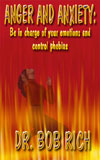General Information on Anxiety and Panic Attacks
This information is taken from several sources, as well as, my own experiences. To the best of my knowledge it is correct. If some part is not clear, please let me know.
Question: Are panic attacks new?
Answer:No. They were described in medical literature over 100 years ago.
Question: Are they becoming more common?
Answer:It seems so but it could be due to better diagnoses, a greater public awareness, and more information being available. Some people think our more stressful lifestyle is a contributing factor.
Question: Do men and women both develop anxiety/panic attacks?
Answer:Yes, but more women than men seem to develop them. Some alcohol programs believe that some men tend to start drinking excessively in an effort to overcome anxiety.
Question: Can people of any age have anxiety/panic attacks?
Answer:Yes.
Question: Are people who suffer from anxiety/panic attacks sane?
Answer:Absolutely. However, until diagnosed and assured, it is not uncommon for the people to feel they are going insane.
Question: Can you tell if a person is having a panic attack?
Answer:In many cases no. They look and act as though nothing is wrong. However, in the midst of a panic attack, they may suddenly have to bolt for the nearest exit without regard to anything else.
Question: What causes anxiety/panic attacks?
Answer:There are various ideas. Some feel it is genetics, others believe past environment - particularly the environment in which they grew up. Still others say a combination of the above, and there are those who say none of the above. --- Regardless of the cause, it is a chemical imbalance in the brain. Diabetes is a chemical imbalance and so are panic attacks.
Question: How often do panic attacks occur?
Answer:From one every few years; to several a day.
Question: What is anticipatory anxiety?
Answer:It's rather like stage fright which some actors experience before going on stage. The actor overcomes it and goes out onto the stage. In the case of people with panic attacks, the stage is the area outside of their safe zones. They have an anxiety that they may have a panic attack. If they do not leave their safe zone because of the anticipatory anxiety, they have developed agoraphobia.
Question: What is agoraphobia?
Answer:If a person becomes uncomfortable or develops panic attacks when they leave the house or a certain part of the house, then agoraphobia is present. It is very difficult, if not impossible for them to venture very far from their comfortable area or safe spot.
Question: Are safe spots always in the house?
Answer:Not always. There may be additional safe areas, such as, in the office, etc.
Question: Why do elevators, bank line-ups, etc. cause anxiety to build up?
Answer:The person is trapped. An escape route is not readily available.
Question: Do all people with anxiety/panic attacks show the same symptoms?
Answer: No. Some may be perfectly all right driving while others have a terrible time. The same is true of various situations.
Question: How is the illness treated?
Answer:Usually with a combination of medication and counseling.
Question: Where can I find a doctor/psychiatrist/psychologist who is able to treat the illness?
Answer:Ask your doctor, a local hospital, or university.
Question: Will the person ever get over the illness?
Answer: Yes. For some it takes more time than others, but they will.
Question: What are panic attacks like?
Answer:Try to explain to a man what being pregnant is like. Unless you have been there, it is difficult to understand. Have you ever been so frightened that you panicked and just wanted to get out of the situation? If you have been in this situation, you know the adrenaline starts flowing as it prepares you to fight or run. Your heart speeds up, your breathing rate increases, and you are just plain scared and want out. Once you have left the danger zone and found a safe place, your body starts returning to normal. With panic attacks, this same response is triggered off; frequently with no apparent cause.
Question: Do panic attacks ever reoccur after one is free of them for several months or years?
Answer:Some people have a relapse. Most get over it much faster than they got over the first bout. Sometimes this relapse lasts for a few days.
Question: Where can I find out more information?
Answer:Other parts of this site contain a great deal of information.
Question: What is a caregiver or support person?
Answer:A very important person(s) in the life of ill people. The support person is their emotional supporter, as well as; being the person who will help them get well by being with them as they go into scary situations. The ill person trusts the support person to see that no harm comes to them. They rely on this person to be their hand-holder. Their supporter. The person who will lead them to safety if overwhelming problems arise. In short, you are their life line.
Question: Isn't that a very responsible function?
Answer:Yes, but also a very rewarding function. Spouses frequently find that when the panic attacks have gone, they have grown closer together and understand each other more.
Question: Can more than one person be a support person?
Answer: Certainly. If several people in a family/friends work together, all the better.
Question: Where can I find out more information on being a support person?
Answer: There is not that much information on the net. Also, you will find some people do not agree on the best approach. I have written up a few suggestions which I have found help.
next: Legal Stuff
~ all anxiety disorders caregiver articles
~ anxiety-panic library articles
~ all anxiety disorders articles
APA Reference
Staff, H.
(2007, February 23). General Information on Anxiety and Panic Attacks, HealthyPlace. Retrieved
on 2025, November 7 from https://www.healthyplace.com/anxiety-panic/articles/general-information-on-anxiety-and-panic-attacks

 About halfway through my high school teaching career, I developed cancer which led to almost continuous rounds of radiation and chemotherapy. I beat the cancer, but the stress triggered
About halfway through my high school teaching career, I developed cancer which led to almost continuous rounds of radiation and chemotherapy. I beat the cancer, but the stress triggered  Basically, I found that we were the pioneers in gathering this information and professionals and lay people alike come to take advantage of it.
Basically, I found that we were the pioneers in gathering this information and professionals and lay people alike come to take advantage of it. We all experience some level of anxiety before a test. A little nervousness can actually help motivate us to perform our best. Too much anxiety can become a problem if it interferes with your performance on tests. Some strategies for dealing with test anxiety:
We all experience some level of anxiety before a test. A little nervousness can actually help motivate us to perform our best. Too much anxiety can become a problem if it interferes with your performance on tests. Some strategies for dealing with test anxiety: To overcome anxiety, phobias, or panic attacks it is of paramount importance to learn how to relax. It is impossible to feel relaxed and tense at the same time. People who live with high levels of anxiety often do not know how to relax or to release the tension stored in their muscles that is contributing to the experience of anxiety.
To overcome anxiety, phobias, or panic attacks it is of paramount importance to learn how to relax. It is impossible to feel relaxed and tense at the same time. People who live with high levels of anxiety often do not know how to relax or to release the tension stored in their muscles that is contributing to the experience of anxiety. One day in 1993, my 7-year-old son was home sick from school and called me in my office to tell me that the World Trade Center had been bombed. I thought he was joking and told him so, but he said, "No Dad, I'm not kidding. Come and look at the TV." Some days later I was asked if I would volunteer to be available to victims of the bombing for critical incident debriefing. This was the first time I had ever heard about this process.
One day in 1993, my 7-year-old son was home sick from school and called me in my office to tell me that the World Trade Center had been bombed. I thought he was joking and told him so, but he said, "No Dad, I'm not kidding. Come and look at the TV." Some days later I was asked if I would volunteer to be available to victims of the bombing for critical incident debriefing. This was the first time I had ever heard about this process. Your life is not in danger. During a panic attack, the sufferer is often convinced that s/he is having a heart attack or a stroke, and is dying. THIS IS NOT SO. The symptoms of heart attacks and strokes are quite different from those of extreme fear.
Your life is not in danger. During a panic attack, the sufferer is often convinced that s/he is having a heart attack or a stroke, and is dying. THIS IS NOT SO. The symptoms of heart attacks and strokes are quite different from those of extreme fear. Here is a very slightly modified extract from my book, '
Here is a very slightly modified extract from my book, ' Cognitive therapy for panic disorder is a relatively brief (8 to 15 sessions) treatment derived from the cognitive theory of panic disorder. According to this theory, individuals who experience repeated panic attacks do so because they have a relatively enduring tendency to misinterpret benign bodily sensations as indications of an immediately impending physical or mental catastrophe. For example, palpitations may be interpreted as evidence of an impending heart attack. This cognitive abnormality is said to lead to a "positive" feedback loop in which misinterpretations of body sensations produce increasing anxiety. This in turn strengthens sensations, producing a vicious circle that culminates in a panic attack.
Cognitive therapy for panic disorder is a relatively brief (8 to 15 sessions) treatment derived from the cognitive theory of panic disorder. According to this theory, individuals who experience repeated panic attacks do so because they have a relatively enduring tendency to misinterpret benign bodily sensations as indications of an immediately impending physical or mental catastrophe. For example, palpitations may be interpreted as evidence of an impending heart attack. This cognitive abnormality is said to lead to a "positive" feedback loop in which misinterpretations of body sensations produce increasing anxiety. This in turn strengthens sensations, producing a vicious circle that culminates in a panic attack. Caffeine - coffee, tea, alcohol, coke stimulate an adrenal response in your body, which can provoke anxiety, nervousness and insomnia to name a few side effects. They also deplete the body of necessary vitamins and minerals that help balance our mood and nervous system. Recommended dosage - less than 100mg per day (one cup of percolated coffee or two diet cola beverages per day. Less than 50mg per day is preferable.
Caffeine - coffee, tea, alcohol, coke stimulate an adrenal response in your body, which can provoke anxiety, nervousness and insomnia to name a few side effects. They also deplete the body of necessary vitamins and minerals that help balance our mood and nervous system. Recommended dosage - less than 100mg per day (one cup of percolated coffee or two diet cola beverages per day. Less than 50mg per day is preferable.